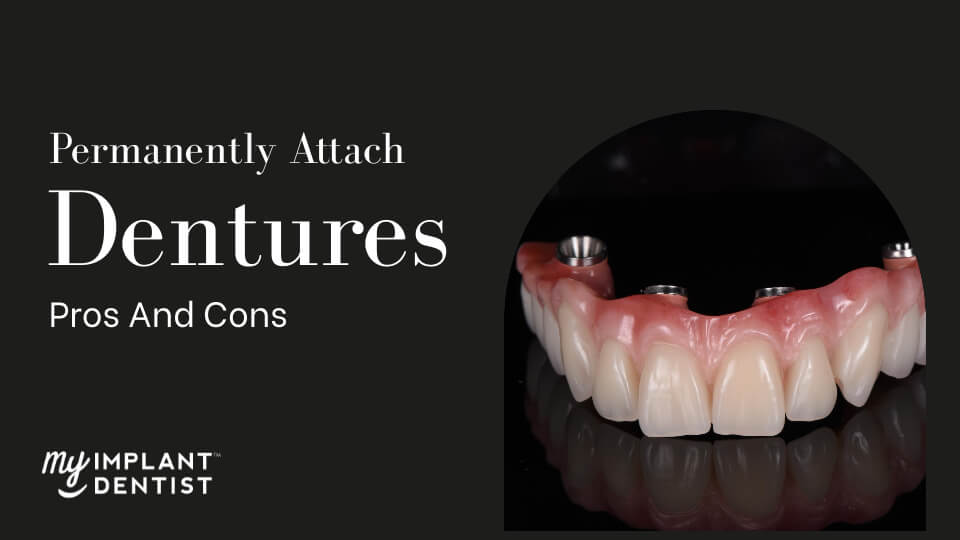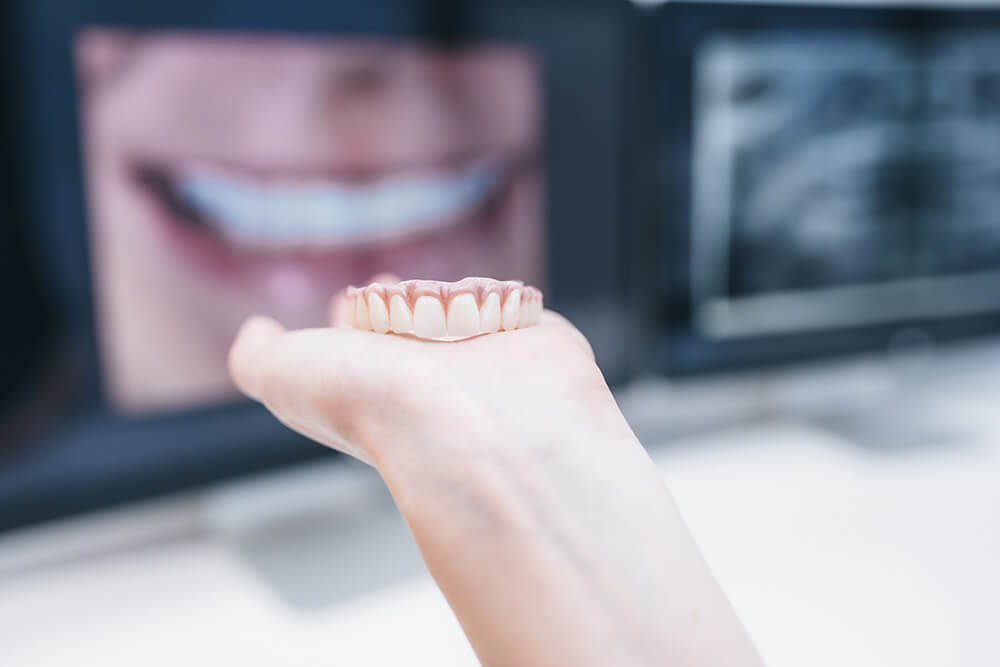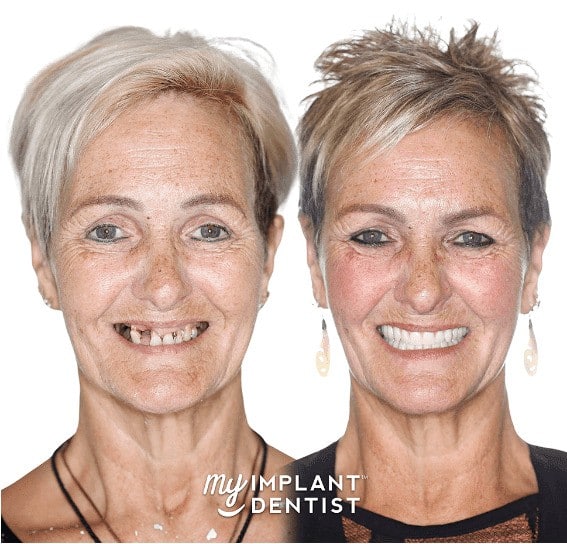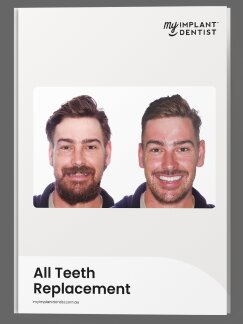
The idea of getting dentures can be full of apprehensions. Don’t worry; we are here to clear all your doubts and answer the common question- “can you permanently attach dentures.”
The answer is yes, but it is not recommended. While there are products on the market that claim to attach dentures permanently, they are not as effective as they claim to be and can actually do more harm than good. The best way to keep your dentures in place is to use a denture adhesive and to take them out at night to clean them.
Keep reading till the end to learn about removable and permanent dentures along with their pros and cons.
Contents
What Are Permanent Dentures?
Permanent dentures are artificial teeth attached to your jaw, enabling you to perform all normal oral activities like chewing, talking, smiling, and supporting your face. Permanent dentures in Australia have no risk of shifting or falling out of your mouth. They are usually made of dental materials like acrylic, zirconia, resin, etc.
Do you know, as per the Australian Dental Association’s report, about 20% of aged Australians are using dentures? Statistics like this make it even more important to know if dentures can be permanently fixed to your jaw. In short, yes, it’s possible to connect them permanently.
However, unlike immediate dentures that can be inserted on the same day of extraction, permanent dentures require a short waiting period. This means you’ve to wait for 6 to 8 weeks following the removal.
The dentures are securely attached using titanium screws, called dental implants. A dental implant is a metal post fixed in place of a missing tooth’s root.
Types Of Permanent Dentures
Typically there are 3 types of permanent dentures that can be surgically placed into the jawbone using dental implants. Let’s know about them briefly.
Dental Bridges
Dental bridges or fixed partial dentures are used to replace missing teeth by filling the gap with fake teeth that take support of the neighbouring teeth. They’ve two main parts:
Abutments
They support the bridge and can be both natural or false teeth. Dental bridges have two abutments, one on either side of the tooth to be replaced.
Pontics
These are artificial teeth used for bridging the gap between abutments. There can be multiple pontics if more than one tooth is missing in a row.
Dental Crowns
Dental crowns are fitted caps that shield damaged teeth by restoring their size, shape, and appearance. Dentists shape your teeth for crowns and take their impressions to create perfect dental crowns.
They are necessary if you’ve damaged teeth or got root canal therapy. Dentists also suggest their usage if you wish to cover teeth with a large filling. These are usually made of zirconia, titanium, stainless steel, and resin.
Dental Implants
A dental implant is surgically placed into your jawbone and is attached to the bone, supporting dental crowns. An abutment is used to connect all the pieces. It has three parts:
Implant or screw
It’s the root of a fake tooth.
Abutment
It’s the connecting post that’s fixed between the implant screw and crown.
Crown
It’s the artificial tooth placed on top of an abutment and appears like your natural teeth.
Pros And Cons Of Fixed Removable Dentures

Let’s dig deeper into the answer to ‘can you permanently attach dentures?’. Fixed removable dentures are efficient and more functional. Read its pros and cons to make a firm decision.
Pros
- All missing teeth are replaced using a single equipment.
- You can take them out of the mouth for deep cleaning.
- They are pocket-friendly in comparison to other options.
- They are non-invasive removable dentures.
- You can get them fixed without anaesthesia.
- It allows performing facial contouring by restoring missing bones. This means it can bring your face shape back if your facial bone is broken due to a mishap.
- Dentists use fixed removable dentures to create a better smile cosmetically. This gives them a levelled canvas to work on.
Cons
- It can fall out of the mouth.
- You don’t feel comfortable.
- You can’t chew hard food.
- It can obstruct the normal pronunciation of words.
- It can impede taste.
- You might feel conscious while speaking and eating publicly.
- Its prolonged use depletes bone density.
- You’ve to replace them after 5 years.
Pros And Cons Of Permanent Dentures
All types of permanent dentures give stability and work like your natural teeth only. You must consider the following pros and cons before taking the final call.
Pros
- They are comfortable to wear and don’t fall out.
- You can chew hard food.
- They don’t obstruct pronunciation.
- Your face won’t sink as implant dentures are used that are supported by your jaw bone.
- They can last for over a decade if handled carefully.
- Less invasive procedures are used.
- It requires minimal dental implants.
- Permanent dentures fit better.
Cons
- It may cause severe bruising and swelling after the sedation effect fades.
- You may catch an infection after the operation.
- Permanent dentures are high maintenance.
- The process is time-consuming and takes time to heal.
- Most dental insurances don’t cover permanent dentures.
What Do Permanent Dentures Look Like?
Now, are you wondering what do permanent dentures look like? Well, they are thinner and match your natural teeth’s shape and colour. It won’t feel weird after they are inserted.
Conclusion
Permanent dentures are a safe option as they look like your original teeth and don’t fall out of your mouth. Professional dentists of My Implant Dentist are experienced in fixing them carefully, restoring your beautiful smile and confidence.
Our clinic is in South Perth, where our friendly and gentle dentists are available for consultation and dental implant procedures.
You can get in touch by calling us at (08) 9361 5544 (Perth). You can write to us at admin@myimplantdentist.com.au.
faq
Can My Dentures Be Permanently Attached?
Yes, inserting permanent dentures in Australia and other countries is possible. They are a great alternative for missing teeth.
Can Dentures Be Cemented In Your Mouth?
Yes, dentures can be cemented in your mouth.
Can Dentures Be Secured?
Professional dentists secure dentures using dental implants.
Can Snap-In Dentures Be Made Permanent?
Yes, they can be made permanent, and you can use them to chew, talk, and speak just like the normal ones.




















